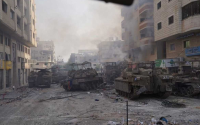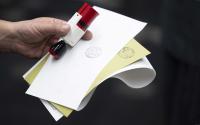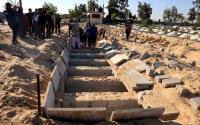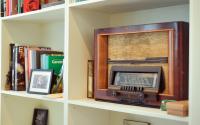Two months ago today, terrorist attacks on the US set an unprecedented challenge to two world leaders, and thrust on to the global stage the man assumed to have been behind the atrocities. We assess the performances on which the outcome of the conflict depends
Independent, 11 November 2001
It's the little things you notice. The hair is a touch greyer, the face more drawn. The shirt hangs a mite loose round his neck. War has a way of draining a politician, even one who rises early, goes to bed early and boasts to friends how weekend runs at the presidential retreat at Camp David in Maryland have produced his fastest jogging time in a decade, three miles in 21 minutes and six seconds.
Not bad for a 55-year-old reformed binge drinker, elected to the White House in the most controversial circumstances, a foreign policy neophyte whom fate suddenly thrust into the most traumatic and complicated foreign crisis faced by a US president in decades. And a dispassionate judgement must be that George W Bush so far has not handled that crisis too badly – certainly not as badly as his myriad scornful detractors once predicted.
"He's been transformed," proclaims Brent Scowcroft, national security adviser to Bush Sr and an informal counsellor of the son. "What I see now is a president who has seized on this crisis and sees this as his mission." Plain hokum, or the eager spin of an old family retainer? Not entirely.
The sheer paucity of expectation has helped. With Bill Clinton, smart thinking and classy rhetoric were part of the package. In the case of Mr Bush, a half-way decent performance is hailed as high statesmanship. Even so, he has had some fine moments, especially early on: his first visit to Ground Zero in lower Manhattan, and then the brilliantly crafted and forcefully delivered address to Congress of 20 September.
But two months after 11 September, and five weeks into the military campaign, the going is tougher, although the capture of Mazar-i-Sharif is a boost. So far Mr Bush has largely resisted pressure for dramatic action – when he has chosen, it has usually been the path of relative caution. How much of course reflects his own judgement, and how much the input of his vastly experienced advisers – Dick Cheney, Colin Powell and Donald Rumsfeld, not to mention his father – is unclear. But the out-and-out hawks have been kept at bay. In the meantime, a president is on a crash-learning course unmatched since Harry Truman was told that Franklin Roosevelt had died.
As a man who abandoned the bottle and discovered religion, Bush has told friends that God has handed him this crisis. As he berates the "evil-doers" and Osama bin Laden the "evil one", his language becomes biblical – disconcerting to world-weary Europeans but less so to the church-going majority of his own countrymen.
Mr Bush from the outset warned of the need for patience. But an America addicted to the quick fix never quite believed it – nor, one suspects, did he. "My husband, like many Americans, doesn't have patience as a very strong characteristic," the First Lady, Laura Bush, admitted last week. Patience is precisely what is required, but convincing his compatriots of this truth is this President's hardest task.
To borrow a phrase he used during his meeting on Wednesday with Tony Blair, "Kodak moments" will be fewer and fewer. However much his handlers try to build an image of gravitas, a weary cliché or goofy malapropism shatters it. The maddening smirk of his first months in the White House has vanished, but not the lurches into Bush-speak.
Nonetheless, his approval ratings remain stratospheric, and the public's war resolve is hardly wavering. Indeed Gallup – which has been measuring such matters for three-quarters of a century – found that Americans today are even clearer about the enemy and why they are fighting this war than they were about Germany and Japan in 1941. It is on the home front that the President's "chairman of the board" approach is not paying off.
The failure to track down the authors of the anthrax-infected letters has dented faith in the basic competence of government – at a moment in modern history when Americans have never wanted more to believe in government. His appointment of Tom Ridge, former Governor of Pennsylvania, as homeland security chief has failed to stop "unspecified" terrorist alerts which serve only to increase public anxiety, such as the warning last month that Californian bridges might be attacked – a threat which the FBI subsequently described as "not credible".
Would the silver-tongued, aggressively empathising Bill Clinton have done any better? In presentational terms, probably yes. Almost certainly too, the former president would have dealt more adroitly with Arab and Muslim concerns over the Israel/ Palestine conflict.
In truth however, the Middle East "peace process" to which he devoted so much energy was in ruins well before Mr Clinton left office. Nor is there any reason to suppose that he, or a President Al Gore for that matter, would have been able to secure a broader and stronger alliance against the terrorists.
Like it or not, it is George W Bush who finds himself in the hot seat at this defining moment of history. Thus far, buoyed by the typical rallying of Americans behind their President in a moment of crisis, he has performed adequately. Unfortunately, the sole certainty is that the seat will get hotter still.






